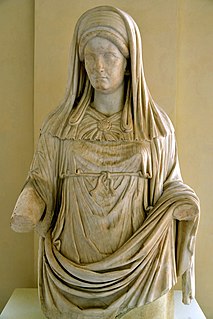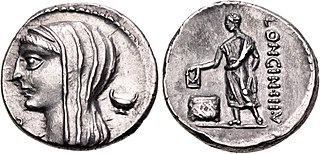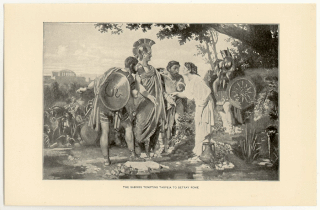 W
WIn ancient Rome, the Vestals or Vestal Virgins were priestesses of Vesta, goddess of the hearth. The college of the Vestals was regarded as fundamental to the continuance and security of Rome. These individuals cultivated the sacred fire that was not allowed to go out. Vestals were freed of the usual social obligations to marry and bear children and took a 30-year vow of chastity in order to devote themselves to the study and correct observance of state rituals that were forbidden to the colleges of male priests.
 W
WAemilia, Licinia and Marcia were Roman vestal Virgins, who were prosecuted for having broken the vow of chastity in two famous trials between 115 and 113 BC. The first trial was conducted by the Pontifex Maximus Metellus Delmaticus, who sentenced to death Aemilia in 114 BC. The decision to spare the other two vestals nevertheless triggered outrage and a special court headed by Cassius Longinus Ravilla was created the following year to restart the investigations. Licinia and Marcia were subsequently put to death as well. The trials were heavily influenced by the political background and network of the participants.
 W
WJulia Aquilia Severa was the second and fourth wife of Roman emperor Elagabalus. She was the daughter of Quintus Aquilius. The praenomen of Julia was given to her after becoming an empress.
 W
WAemilia, Licinia and Marcia were Roman vestal Virgins, who were prosecuted for having broken the vow of chastity in two famous trials between 115 and 113 BC. The first trial was conducted by the Pontifex Maximus Metellus Delmaticus, who sentenced to death Aemilia in 114 BC. The decision to spare the other two vestals nevertheless triggered outrage and a special court headed by Cassius Longinus Ravilla was created the following year to restart the investigations. Licinia and Marcia were subsequently put to death as well. The trials were heavily influenced by the political background and network of the participants.
 W
WAemilia, Licinia and Marcia were Roman vestal Virgins, who were prosecuted for having broken the vow of chastity in two famous trials between 115 and 113 BC. The first trial was conducted by the Pontifex Maximus Metellus Delmaticus, who sentenced to death Aemilia in 114 BC. The decision to spare the other two vestals nevertheless triggered outrage and a special court headed by Cassius Longinus Ravilla was created the following year to restart the investigations. Licinia and Marcia were subsequently put to death as well. The trials were heavily influenced by the political background and network of the participants.
 W
WRhea Silvia, also known as Ilia was the mythical mother of the twins Romulus and Remus, who founded the city of Rome. Her story is told in the first book of Ab Urbe Condita Libri of Livy and in Cassius Dio's Roman History. The Legend of Rhea Silvia recounts how she was raped by Mars while she was a Vestal Virgin and as a result became the Mother of Romulus and Remus the founders of Rome. This event would be portrayed numerous times in Roman art while the story was mentioned both in the Aeneid, and in the works of Ovid. Modern academics consider both how Rhea Silvia is relevant for the treatment of rape victims in Roman mythology as well as the different ways she is portrayed in Roman art.
 W
WIn Roman mythology, Tarpeia, daughter of the Roman commander Spurius Tarpeius, was a Vestal virgin who betrayed the city of Rome to the Sabines at the time of their women's abduction for what she thought would be a reward of jewelry. She was instead crushed to death and her body cast from the southern cliff of Rome's Capitoline Hill, thereafter called after her the Tarpeian Rock.
 W
WAemilia, Licinia and Marcia were Roman vestal Virgins, who were prosecuted for having broken the vow of chastity in two famous trials between 115 and 113 BC. The first trial was conducted by the Pontifex Maximus Metellus Delmaticus, who sentenced to death Aemilia in 114 BC. The decision to spare the other two vestals nevertheless triggered outrage and a special court headed by Cassius Longinus Ravilla was created the following year to restart the investigations. Licinia and Marcia were subsequently put to death as well. The trials were heavily influenced by the political background and network of the participants.
 W
WTuccia, was an ancient Roman Vestal Virgin.